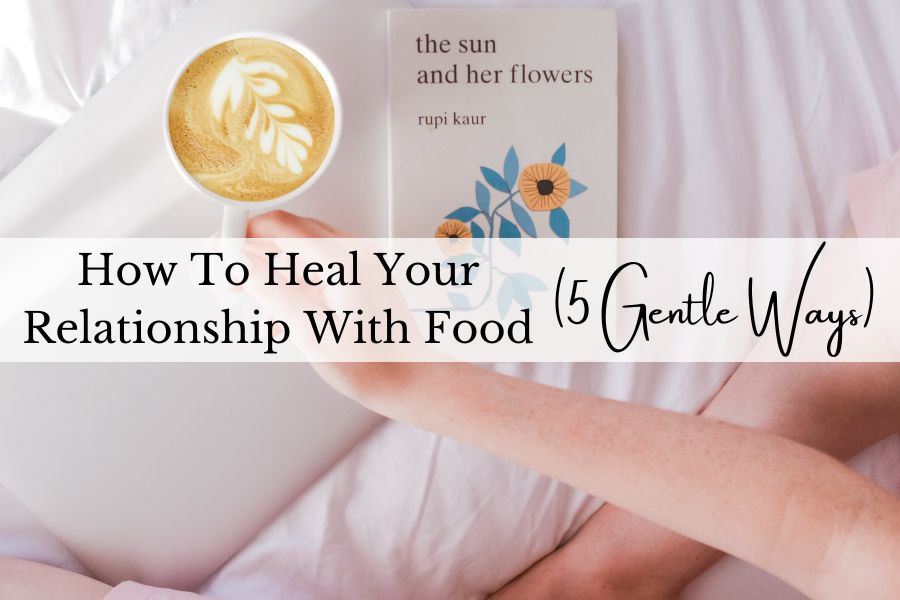Looking to heal your relationship with food? Here are 5 gentle practices to help you get started.

Food can be one of the greatest joys in this world if consumed the right way. All of us are born with instinctual senses that are supposed to guide us toward mindful eating.
Unfortunately, eating can also turn into a coping mechanism, which can lead to an unhealthy relationship with food. Often, we end up resenting the act of eating.
Our minds declare food to be our bodies and is something to be wary about. As a result, we end up resenting the act of eating.
It doesn’t have to be this way.
Your body already knows how to absorb food. It’s your mind’s duty to guide you toward feeding yourself the right way.
By connecting your body with your mind, you can mend your relationship with food.
Through this post, I want to gently nudge you toward the path of intuitive eating. I’m going to start by relaying my own story, and how I healed my eating habits after years of struggling with food.
By the time you’re done reading this, I hope you can see that food is a friend, not a foe to be cautious of.
My Struggle With Food
As a child, I was fascinated by the different colors of fruits we could buy from the market, along with every kind of fast food available around me. I loved spicy food and also had the sweetest tooth in my family.
I always picked the most chocolaty thing at the bakery. My love for cookies was unparalleled. And don’t even get me started on cakes. They were what I looked forward to every year for my birthday.
I won’t go as far as to say that food was my life, but it was definitely an integral part of it. And why shouldn’t it have been?
After all, food is a basic necessity for humans, and can’t be a mere thing we consume as robots without feeling the joy of it.
Food Gratitude Is Important
As humans, it’s our responsibility to appreciate everything that’s been bestowed upon us by nature, including food.
It’s a privilege to breathe the air, drink water, and have food to eat when so many in the world don’t get to.
All of us have the need to satisfy our senses with beautiful things. So it should be no surprise that we’re drawn to deliciousness as well.
It’s When Our Emotions Take Over That Things Go Wrong
Life can be cruel sometimes. And sadly, one of the ways for our minds to deal with bad emotions is to run toward something good. For most of us, that good thing turns out to be food.
I was the same.
When life got difficult, I chose to find comfort in food, not realizing I wasn’t really helping myself by doing so.
For the longest time, food remained my default coping mechanism. Instead of dealing with my pain the right way, I found it easier to eat, fill myself up, and forget.
Besides engaging in emotional eating, I also started eating when I was bored, tired, or simply feeling lazy.
Fast forward a few years, I snapped out of this trance and realized just how wrong I was doing by my body and my mind.
I slowly learned how to control my urges. Through numerous health blogs, I realized the importance of nutritious food, along with the harm that comes from gorging on junk food.
It’s Good To Be Aware, Tricky To Be Too Aware
Now the thing is, food awareness is good.
But hyperawareness around food can be dangerous. It’s a treacherous slope that many of us fall prey to.
My cautious behavior around food helped me reduce weight, but had its own demerits. Sure, I was eating healthy, but my feelings regarding food had grown negative.
Before this, I used to eat mindlessly. But now that I knew the minute details about food, it was all I thought of, and not in a good way.
I counted calories, which isn’t really a bad thing. But it’s a habit that can result in food obsession, and sadly, I fell prey to it.
I was hyper-focused while eating, and felt guilty after having even a single bite of a cupcake. Healthy food made me happy, and anything oily made me cringe.
As a result, I once again started associating food with my emotions, forgetting it was what I’d sought to avoid in the first place.
How I Healed My Relationship With Food After Struggling For 20 Years
It wasn’t until last year that I realized that food isn’t bad or good, but eating habits are.
For many months, I’d maintained a healthy streak by consuming only healthy food. But in doing so, I neglected the part of my soul that really wanted a bite of my all-time favorite cake.
The truth was, I didn’t know if I could trust myself around sugar. I was sure if I had a bite, I would want to eat all of it as I used to during my teen years.
But I found ways to fix this, and can now gladly say that I own a healthy relationship with food. I listen to my body, then make a sound decision while picking something to eat.
If I really want to eat cookies, but my stomach tells me it might be too heavy after a meal I’ve just had, I reach for a bite of dark chocolate instead.
This is what you call mindful eating and something that took me a long time to build.
If you’re someone who’s been struggling with negative emotions around food, I want you to heal yourself. I know you can do it because I did it too. And I’m not a superhuman. I’m just like you, and I believe in you. 🙂
In this post, I’ve shared the 5 things I did to fix my relationship with food. I actively worked on each of these tips and succeeded in nurturing my eating habits. Hopefully, they’ll help you the same way.
Let’s dive in!
How To Heal Your Relationship With Food (5 Gentle Ways)
1. Give Yourself A Tone Of Self-Love
Listen to me when I tell you this.
You need to be giving yourself a lot of love if you want any kind of healing to happen inside you.
I neglected self-love for a long time. And even after realizing it is a necessity, there are days when I struggle to truly care about myself. But for the most part, I am not hesitant to open my journal and write that I love myself.
Why is it important that you love yourself?
How can it help you end your struggle with food?
It’s quite simple, really. By showing yourself some much-needed love, you remove the part of you that’s longing to be filled.
Many of us turn to food for comfort or berate ourselves for over-indulging because we’re trying to satisfy ourselves by feeding our souls. We want to get to an eternal state of fulfillment and mistake the solution to be food.
But what is it that we really want?
Well, a lot of things, to be honest. But at the very crux of the pile of things we desire, is the need to be in love with ourselves.
Tips To Practice Self-Love
- Meditate for at least ten minutes a day.
- Write a kind letter addressed to yourself.
- Accept your flaws, and love yourself for who you are.
- Practice gratitude.
- Let go of the need to be in control at all times.
- Forgive yourself for past mistakes.
- Imagine giving yourself a hug (it really helps).
- Talk to a good friend who always lifts you up. Look at yourself from their point of view.
Try at least one of the above tips, and see if it helps. You won’t know until you try, and I really encourage you to not skip this part of your healing.
2. Start Keeping A Food Journal (Or A Simple Journal)
I started keeping a journal at the beginning of 2022, and it was one of the best steps I’ve taken in my life.
Journaling is the best way to connect to your true self and recognize your most basic needs. It’s also the best way to show gratitude and practice self-love.
A food journal is often a handy tool for those who struggle to maintain a good relationship with food.
You can record your food emotions, keep tabs on what you’re eating and how you feel about it, address moments where you over-indulged, and write kind letters to yourself.
Please keep in mind that you don’t have to do this long-term. Your end goal here is to learn how to eat intuitively, and once you have that under your belt, you can let go of food journaling.
I understand that journaling about food might make some of you more anxious about food. And if you feel this could happen to you, then don’t do this.
But for those of you who like the idea of penning down their food-related thoughts, and feel like this could free their minds, go ahead and try it.
In either case, having a simple, everyday journal is always a good idea.
3. Learn The Art Of Mindful Eating
Mindful eating is about connecting your senses to your gut and making every food-based decision taking your body’s needs into consideration.
It’s pretty clear how mindful eating could be the key to seeing food in a positive light.
It could help you get rid of your bad eating habits, teach you how to be kind with your thoughts, and heighten your senses while you eat.
When you learn mindful eating, every bite of your food becomes savor-worthy, and you start treating food the way you’re truly supposed to. As a friend, that is, and one that brings you great joy and makes you smile.
Ultimately, mindful eating merges with intuitive eating and keeps you healthier and stronger. You’ll eventually be in control of your thoughts, and have a better relationship with food.
You’ll love reading: 13 Unique Ways To Practice Mindful Eating
4. Practice Self-Care Until It Becomes A Routine
Just like self-love, practicing self-care can be game-changing for you.
There are many ways to define self-care. But in my perception, self-care is the act of engaging in activities that take care of our basic needs.
In addition to this, it’s also about finding joy in little things and connecting with your inner self through everyday mindful practices.
It’s amazing how big a difference little activities can make in one’s life. I am one such example. While mending my relationship with food, I made sure to shower myself with a good self-care routine.
Everything I did helped me connect to myself, and in the end, I was able to let go of the need to rely on food for help.
It can be hard to recognize your inner voice that’s asking for self-care, but all too easy to ignore it.
By denying yourself the peace that comes from self-care, you might be pushing your brain toward food, since it’s the most accessible and visible thing around.
So don’t make this mistake. Do yourself the favor of picking a few daily activities of self-care. And see for yourself how it improves your health.
Self-Care Ideas For Everyday Practice
- Yoga
- Meditation
- Regular skin-care
- Taking naps when your body asks for it
- One cup of green tea every day
- Journaling
- Drinking plenty of water
- A long de-stressing bath
- Doing whatever makes you feel happy from within 😀
5. Realize that ‘You Are Not What You Eat’
While chasing a health goal, you might start classifying food items as good food and bad food.
I understand the use of the term bad food. Even I use it at times to relay some health-related information to my readers. But here, I would like to make a distinction.
Food isn’t bad, but eating habits can be.
Health advisors often ask you to cut down on things like sugar, because it’s addictive and leads to excessive eating.
To put it simply, a slice of cake isn’t bad, but eating a whole cake is. And that’s just because your stomach isn’t wired to handle that much sugar at once.
If you want to build a sound relationship with your food, you need to draw a line between the act of eating and bad eating habits. And in doing so, you need to start dissociating your identity from food.
No food in the world should make you feel bad about yourself. This is simply not good for your soul.
Click here to read my post on how to fix bad eating habits.
Do note that recognizing bad habits and fixing them is one thing. But associating what you eat with your identity is a hole you need to avoid.
It doesn’t matter what you eat, or how much of it. The feeling of disgust after eating should never be encouraged.
Rather, if you’ve overindulged in something and your gut protests afterward, you need to chalk it up to your habit of overeating.
Find ways to fix this habit, rather than thinking of ways to eliminate certain food groups because you feel dirty.
You are not what you eat.
Please don’t ever forget that.
Conclusion
It can be difficult to separate food from our emotions but is not an unachievable task. Building a good relationship with food is the key to living a healthy lifestyle.
Food doesn’t have to rule your thoughts. It shouldn’t be a comfort zone for your troubles either. You also cannot let it rule your body image.
You are not what you eat, rather you are what you want to be.
Through mindful practices, we can learn how to love ourselves, and slowly dissociate our identity from food.
Have more tips you’d like to share?
Leave a comment. I would love to know your thoughts.




Leave a Reply